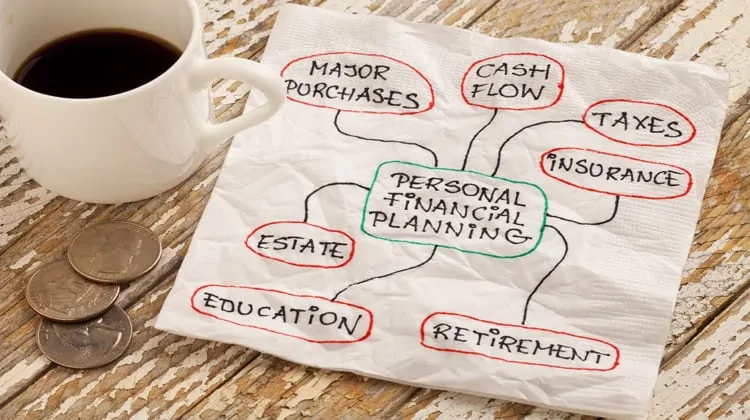THIS POST MAY CONTAIN AFFILIATE LINKS. PLEASE SEE MY DISCLOSURES FOR MORE INFORMATION
The first step in securing your financial future is to make a plan.
But even if you have a plan, or even if you are in the process of creating a plan, there are financial pitfalls that you must avoid.
Making common financial planning mistakes can cost you tens of thousands of dollars in the future.
It could even cost you the opportunity to be financially free one day.
Because of this, you want to make sure you don’t make these retirement planning mistakes at all costs.
Below is a list of 13 common financial missteps people get into and how to not make them.
If you’ve made these mistakes, don’t feel bad as many others have as well.
The important thing is that you begin to work on fixing them so that you can still get ahead.
Remember, it’s never too late to start moving in the right direction.
If you haven’t made these money mistakes, good job!
But you should still take some notes so you can ensure you don’t fall for them in the future.
Table of Contents
13 Biggest Financial Planning Mistakes You Make
#1. Not Taking Action On Your Plan
Sadly this is one of the biggest money management problems most of us make.
You put all your time and effort into creating your plan and get excited thinking about your financial goals and dreams becoming a reality.
Then you take a week off.
That week turns into a month. Next thing you know, you have completely forgotten about your plan.
You start making bad financial decisions here and there and the next thing you know, you are behind on your retirement savings.
Make sure you don’t stop once your plan is made.
Related to this is having vague goals.
With little detail, it will be hard to get excited about your goals and dreams.
It’s a good idea to make your plan is as detailed as possible so it inspires you to take action.
A specific goal like spending a month traveling through Italy is much better than simply saying you want to travel.
#2. Not Having An Adequate Emergency Fund
Many experts recommend three to six months of living expenses in an emergency fund.
Given the tough economy, I think your emergency savings should be closer to nine months worth of living expenses.
Why?
You never know when a job loss might happen and you never know how long it may take you to find another one.
It’s better to be safe than sorry.
You can start your emergency fund with CIT Bank.
I use them and love them.
They offer one the best yields on online savings accounts!
Click the link below to open your free account!
#3. Not Creating A Budget
I know, there isn’t anything fun when it comes to budgeting, but without one, poor money management is almost guaranteed.
Try to look at it not as a restriction of where you can spend your money, but a plan on where your money goes.
With a monthly budget, you know how much you spend eating out.
If you are getting close to that figure, then you should make note of it.
You don’t necessarily have to stop eating out for the rest of the month, but maybe cut back somewhere else, like clothing, if you still want to eat out.
The bottom line is that a budget is like a relationship.
It’s give and take.
Overspend in one category and make sure you underspend in another.
Just make sure you review your budget more often than only at the end of the month.
If you do this, you won’t be able to catch issues when they arise.
#4. Not Paying Yourself First
Paying yourself first is the easiest thing you can do to avoid financial troubles.
Sadly it is a costly mistake many people make by not saving first.
You should be doing this regardless where you are in your planning process.
If you have a retirement plan through your company, then make sure you are contributing up to at least the match.
Then, if you have direct deposit on your paycheck, you should set up an automatic transfer to have money taken from your checking account and transferred to your savings account every pay period.
When you pay yourself first, you are certain to save money each month as opposed to spending everything and then complaining you don’t make enough money to save.
#5. Not Living Within Your Means
So many people spend more than they make.
They try to keep up with others and while it may look like they are financially well off, in reality they are swimming in debt.
Be happy with how much you earn and don’t overspend just to keep up.
You’ll be happier and much better off in the end.
Additionally, as your income increases, it is important to continue living as if you never received a pay increase.
This is also known as lifestyle creep.
As your pay increases, you buy a bigger house, a bigger or nicer car, more clothes, etc.
A pay increase is not an excuse to buy a new car.
Your car needing more in repairs than it is worth is reason to buy a car.
Make it a point to not spend more than you make.
#6. Not Investing In The Stock Market
Investing in the stock market is a simple way to have long term financial success.
And it isn’t as hard or as scary as many people think.
You simply need to develop an investment strategy that outlines your goals, like why you are investing in the first place.
Is it saving for retirement? Your children’s education?
Whatever your goal is, you need to define the risk tolerance you are willing to assume with your money and then pick the right investments.
For some this is individual stocks. For others it is mutual funds.
Once you complete this step, you need to start investing on a regular basis to help reach your goal.
And if the idea of investing is too much for you, you should seek the help of a financial planner to assist you.
#7. Investing Before Getting Debt Under Control
I’m not talking about all investing or all debt.
Specifically, I am talking about non-retirement investing and non-tax deductible debt, like credit cards.
There is no point investing and earning a 6% return when you are paying 18% interest on your debt.
Get a guaranteed 18% return on your money by paying off all of your credit cards first.
Once you have this debt paid off, then you can start concentrating on investing in non-retirement accounts.
#8. Having Consumer Debt
This goes along with the point above and is the biggest money mistakes to avoid.
If you have credit card debt and personal loans, you need to get to a place when you are not spending more than you make.
There is no reason to have consumer debt.
If you cannot pay for something in cash, then you cannot afford it.
#9. Paying Extra On Your Mortgage When You Have Consumer Debt
The recent trend is to own your home outright, to get rid of your mortgage.
I am all for you paying off your home loan.
But many make the common mistake of putting extra money towards your monthly mortgage payment instead of paying off your credit card debt first.
Most likely, your mortgage interest rate is 6% or less.
This is before you take into account the tax-deductibility of the interest you pay.
After this is factored in, your 6% interest rate mortgage is closer to 4%.
Your credit card on the other hand is charging 18% and you cannot deduct any of the interest on your taxes.
When you pay extra on the higher interest rate debt first, it will help you reach your financial goals quicker.
#10. Not Saving For Retirement
If you have a 401k plan through your employer and get a match, you need to invest at least that much in the plan.
By getting a 3% match you are getting free money from your employer.
Too many people pass this up.
Once you invest to meet the match, you need to open a Roth IRA and save the maximum there.
After that, increase your 401k contributions.
All of the money you save in retirement accounts is done at a tax advantage.
With a 401k or Traditional IRA, you reduce your income tax by contributing to these plans.
This tax savings can be huge as your income increases.
With a Roth IRA, you won’t get the tax savings, but you can withdraw the money once you reach retirement age tax free.
Make it point to save as much as you can for your retirement.
No matter which plans you choose, you will enjoy financial security if you make it a point to save.
#11. Not Increasing Your Insurance Deductibles
When I set out on my own and had my own homeowners and auto insurance, I had a $500 deductible for the simple fact that I did not have much money saved up.
Should something happen and I needed to file a claim, I could not have afforded to be out more than $500.
But once I built up my emergency fund, I increased my deductible to $1,000.
Why?
Because it lowered my annual premium.
If I pay more out of pocket, my insurance premiums are lower.
I am shifting some of the risk from the insurance company to me.
This risk is minimal.
Review your insurance coverage and increase your deductibles of they are less than $1,000.
You should also be shopping around for coverage every few years.
This ensures you are paying the lowest premiums for affordable health insurance.
Be sure to look into bundling your coverage too.
This is where you have auto and homeowners insurance with the same company.
Doing this will get you lower premiums as well.
Related to this is life insurance.
Make sure when you take out a policy, you compare life insurance rates between a few companies.
While you don’t want to pick your insurance on price alone, it makes sense to find the best insurer that is going to charge you the lowest premium for coverage.
#12. Not Having Umbrella Insurance
Over time, as you earn more money and increase your assets, it is important to protect them should a situation occur.
Unfortunately most people ignore this.
The result is the costliest retirement planning mistake you can make.
By having an umbrella policy, you will have additional coverage on top of your auto and homeowners coverage.
Since most homeowners policies are limited to $500,000, you are on the hook should someone sue you for more.
For example, let’s say you have $500,000 in homeowners coverage.
A friend of your son comes over and slips on the sidewalk and breaks his neck.
If they sue you and are awarded $1 million, you have to come up with $500,000.
If you had an umbrella policy for $1 million, you wouldn’t owe anything.
The annual premium for umbrella coverage is not very expensive and should you have to use it, you will be grateful that you have it.
#13. Ignoring Estate Planning
It’s not enjoyable to think about, but out time is going to come to an end.
Grieving over the loss of a loved one is hard enough on its own.
Add in trying to figure out their financial picture and wishes and keeping your emotions in check makes it close to overwhelming.
Do yourself and your loved ones a favor by getting your estate plan in order.
Indicate who gets your money and possessions and how much.
And don’t just look at estate planning documents as an end of life situation either.
You want to take into account long term care as well.
Too many people fall victim to health issues and cannot take care of themselves.
By having a power of attorney, medical directive, living wills, and other documents completed, it makes things much easier to handle.
Wrapping Up
At the end of the day, these are the most common financial mistakes people make.
I’ve made some during my life as I am sure some of you reading this have as well.
It’s important to learn from them so that we don’t repeat them again and again.
Hopefully you haven’t made too many of these retirement planning mistakes and now that you know them, can avoid them completely.






You make some very good points! The two that I had not thought of were your final two thoughts. I am not sure how much the savings would be from upping your deductible, but it is definitely worth a phone call. As for the “Umbrella Policy”,I think I will have to look into that. I did want to say one other thing. My father told us that we should pay extra on our mortgage if we could. I nodded and said that we would try but after discussing it with the wife, we came to the realization that if you are not going to stay in the current home you are in for the full 15 or 30 year term, what is the point. On one hand it does pay down the principal which could set you up better when you sell the house in a market that is further down than when you bought. On the other hand though, if you aren’t going to get a lower payment, then you might as well take the extra money and put it into something that is interest bearing.
A phone call to your insurance company only takes 5 minutes. And in most cases, a $1 million dollar umbrella insurance policy will run you around $200/year.
As for the mortgage pre-payment, there are a lot of factors that you can take into account when making this decision. Without creating a blog post out of this comment, I’ll just say to remember this: whatever you pay extra on your mortgage, is a guaranteed return on your money. So, if your interest rate is 8%, pre-paying is a guaranteed 8% return on your money. If your rate is low (under 5% before taking into account the tax deduction), you are better off investing your money.
Brilliant list – in fact I am going to print it off and tape it my fridge.
Sometimes we complicate these things in order to give ourselves an “out” an excuse not to just get on and take care of our business.
This clearly states what needs to be in place – and although some minor details are different if you are out of the US, the basics are sound.
Good to hear!! You’re right, when it comes to personal finance, many times we make it more complicated than it needs to be.
Great article. One thing more is that they fail to stick to the plan. If they encounter a hindrance and they were not able to overcome it, they quit. It’s never good to quit too early, better to have determination and persevere. Quitters never win.
You have touched some very valid points.Also,not planning for your retirement at an early stage is another common mistake that people tend to make.We keep on delaying things which adds to the hurdles in our financial journey.So,with the help of proper planning and budgeting,we can reach our financial goals in an easy way.The most important part being, putting our plans to action as you have rightly highlighted in one of your points.
Thanks for the nice info.